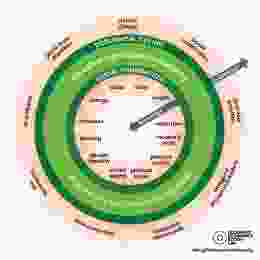
Doughnut Economics: Why Economic Growth Alone May Not Be Enough
The Renegade Economist
Kate Raworth isn’t your ordinary economist. She is a self-proclaimed “renegade,” who is challenging the world’s fixation on Gross Domestic Product (GDP) and the chasing of endless economic growth. Frustrated by traditional models that prioritise growth over people and the planet, Kate has set out to rewrite the economic rulebook.
Her revolutionary framework, Doughnut Economics, is reshaping the conversation around what it means to thrive, offering a model that balances meeting everyone’s basic needs while respecting the Earth’s ecological boundaries, as detailed in her 2017 book of the same name.
After 12 years as a senior researcher at Oxfam and working with the United Nations Development Programme, Kate now brings her innovative thinking to Oxford and Amsterdam University as an academic. Through her Doughnut Economics Action Lab, she’s taking her ideas to the world stage—and yes, the doughnut metaphor is as deliciously intentional as it sounds!
Unpacking GDP And Its Limitations
GDP calculates the total value of goods and services produced by a country over a certain period and is hailed as the ultimate measure of economic performance. Politicians talk about it endlessly, and we tend to accept it as our saviour, without question. Developed in the 1930s, it gained traction during World War II as a mechanism for tracking production and managing wartime economies. Governments love it because it’s fairly straightforward to track, and when GDP goes up, it signals economic growth, and everyone’s a winner. Right?
But GDP only tells part of the story. While it captures economic activity such as business investment, consumer spending, and export and import activity, it overlooks factors such as environmental degradation, and overall societal well-being.
GDP doesn’t care whether growth comes from building schools or cleaning up oil spills—it treats all economic activity the same. It excludes unpaid work, like caregiving, and ignores climate change, the depletion of natural resources and ecosystem damage. Furthermore, continued growth often leads to overconsumption and resource depletion, pushing the planet towards dangerous tipping points.
The Doughnut Way
At the heart of Doughnut Economics is a simple yet profound concept: the doughnut. The inner ring represents the social foundation, covering essential needs like health, education, and housing. The outer ring symbolises the environmental ceiling, marking the limits of Earth's ecosystems. The space between these rings is the "safe and just space" where humanity can thrive within the planet’s natural boundaries.
This framework shifts the focus from economic growth at any cost, encouraging us to build economies that are regenerative and distributive by design. In contrast to the relentless pursuit of GDP, Doughnut Economics offers a vision of progress where success is measured by how well we care for people and the environment, and where both thrive.
Our Addiction To GDP
The withdrawal from GDP and economic growth dependency won’t be easy, especially since our economies are structurally tied to continuous, and endless growth. When growth stalls, we risk a recession, potential job losses, funding cuts, and other serious consequences.
Many in political and economic circles believe that decoupling economic growth from resource consumption is neither feasible nor palatable, leaving them deeply sceptical and fearful of the consequences. Unfortunately, we’ve built an economic system that relies on economic growth to function, and as a society, we become unstuck when GDP growth doesn’t materialise.
A Way Forward
With governments, businesses, and financial systems built on the belief that economic growth equals progress, no matter what, shifting this mindset will require political courage and a change in societal values. This will be very difficult to change, but perhaps not impossible with time.
Local movements like citizen assemblies are already springing up, and progressive cities like Amsterdam and regions like Cornwall are using Doughnut Economics to guide policies focused on sustainability and equality. As more cities and regions adopt this approach, momentum will grow, making it harder for policymakers to ignore the Doughnut movement.
With the climate crisis unfolding before our eyes and many more communities increasingly impacted by regular extreme weather events like flash floods and wildfires, the case for Doughnut Economics only strengthens, as more people see the need for an economic system that prioritises the health of both planet and people.
A Time To Thrive
Doughnut Economics challenges the status quo and offers a clear path forward; one rooted in balance. It’s not about abandoning progress but redefining it. As more communities, businesses, and local governments adopt the Doughnut framework, we move closer to an economy that works for everyone—not just for a few—while ensuring Earth’s ecosystems remain intact for future generations.
Although the road ahead seems very long and difficult, history has shown that societal change—like women’s voting rights, and the civil rights movement —eventually prevails.
Doughnut Economics, much like previous transformative shifts, may face huge political and economic resistance, with people questioning if it’s too radical or too fast. But just like those earlier significant societal changes, what seems radical today is seen as the obvious and unquestionable in the future.
It’s possible that in one hundred years or so, GDP might be resigned to the history books, leaving people to wonder why anyone doubted the shift towards an economy centred on the thriving of both the planet and the humans who inhabit it.
Here is a link to learn more about https://doughnuteconomics.org/
Please reach out and contact us at
If you're looking for support on your sustainability journey, or would like to discuss partnership opportunities, we'd love to hear from you.





